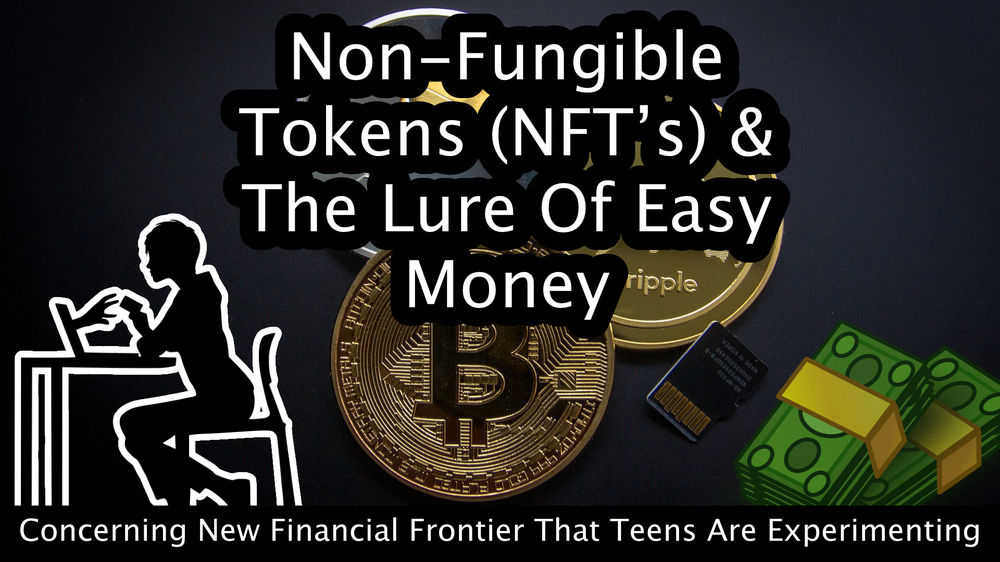
Non-Fungible Tokens (NFT’s) & The Lure of Easy Money
A Concerning New Financial Frontier That Teens Are Experimenting With
Over the past several months we have received several messages from teens, and have fielded questions from students in our live virtual school presentations, asking us about our thoughts on the safety and security of Non-Fungible Tokens (NFT’s)
To understand NFT’s we need to know about blockchains and cryptocurrency. According to Investopedia:
“A blockchain is a distributed database that is shared among the nodes of a computer network. As a database, a blockchain stores information electronically in digital format. Blockchains are best known for their crucial role in cryptocurrency systems, such as Bitcoin, for maintaining a secure and decentralized record of transactions. The innovation with a blockchain is that it guarantees the fidelity and security of a record of data and generates trust without the need for a trusted third party.”
Think of a blockchain as a distributed public ledger that records transactions.
What are NFT’s:
NFT’s are blockchain-based deeds of ownership to different kinds of digital items that can’t be replaced with something else. They can often be a digital illustration/art, movie, or even music that can be purchased and owned digitally. An NFT directs a person to a location of a unique file where the art, illustration, movies or music is being stored online. For older adults, think of NFT’s as an irreplaceable hockey card or baseball card that is one of a kind. NFT’s allow an owner to monetize their copyrighted work that will pay a percentage to the owner every time it is sold or changes hands. NFT’s can only have one owner at a time, and offers exclusive ownership rights to the owner of the NFT. Like any collectable, NFT’s become a speculative asset where the owner hopes the value will increase and therefore sell for a profit. However, like traditional artwork or hockey cards, NFT’s can increase or decrease in value and can therefore be very messy and risky. It has been reported in Rolling Stone magazine that since January 2022, NFT sales has passed the 4-billion-dollar mark internationally.
To sell or “mint” an NFT, a creator often has to pay what is called a “gas” fee which averages around $70 on several NFT hosting sites, and often the creator will have to pay a “site fee” or “subscription fee “which can range in costs. Upon selling an NFT, the seller will often have to pay a percentage of the sale to the host site. Can a creator mint an NFT for free? – yes. Often such a hosting site will pass the minting and listing costs to the buyer, this is known as “lazy mining”
To purchase an NFT, a person is required to use a form of cryptocurrency, the most popular is called “Ethereum”, which can be purchased with real money in a crypto exchange such as “Coinbase Global”. The cryptocurrency, that has been purchased with real money, is then transferred to what is known as a “crypto-wallet” that has a specific key that should NEVER be shared outside of a credible NFT mining site. Think of a crypto-wallet as a digital checking account, that can then be used to start browsing and purchasing NFT’s in online marketplaces.
Our Opinion:
Yes, there is a financial risk to NFT’s but there are also some financial benefits that can take place as well. An 18-year-old who goes by the name “FEWOCIOUS” claims to have made millions of dollars in his NFT’s. However, it must be emphasized that making huge amounts of money in NFT’s is very rare. Many other teens have stated that rather than cutting lawns to make a few bucks, NFT’s allow them to put spending money in their pocket.
NFT scams are flooding most popular social media sites that are frequented by teens such as Discord, Snapchat, TikTok, and Instagram. On the site, the fraudster posting fake minting links (also known a phishing attack) advertising the release of hard to come by collections, or ask for tokens to create a new NFT. These collections and new NFT’s never come to fruition, and now the fraudster has access to your crypto wallet and will steal all the tokens and any NFT’s that the target has collected. Rolling Stone Magazine wrote a great article called, “NFT Scams Are Everywhere. Here’s How to Avoid Them” (1)
Presently, we believe that trading NFT’s is still too risky because their future is uncertain and there is very little history to make an educated decision on their performance. Much like the stock market, NFT’s can be a high-risk endeavor. Also, the crypto world is the new frontier for online crime, especially fraudulent crime, and one fraught with danger if a user is not fully educated in blockchain cryptocurrency exchanges. Many a teen and adult have lost lots of money on the buying and selling of NFT’s.
Digital Food For Thought
The White Hatter
This content was originally published here.


